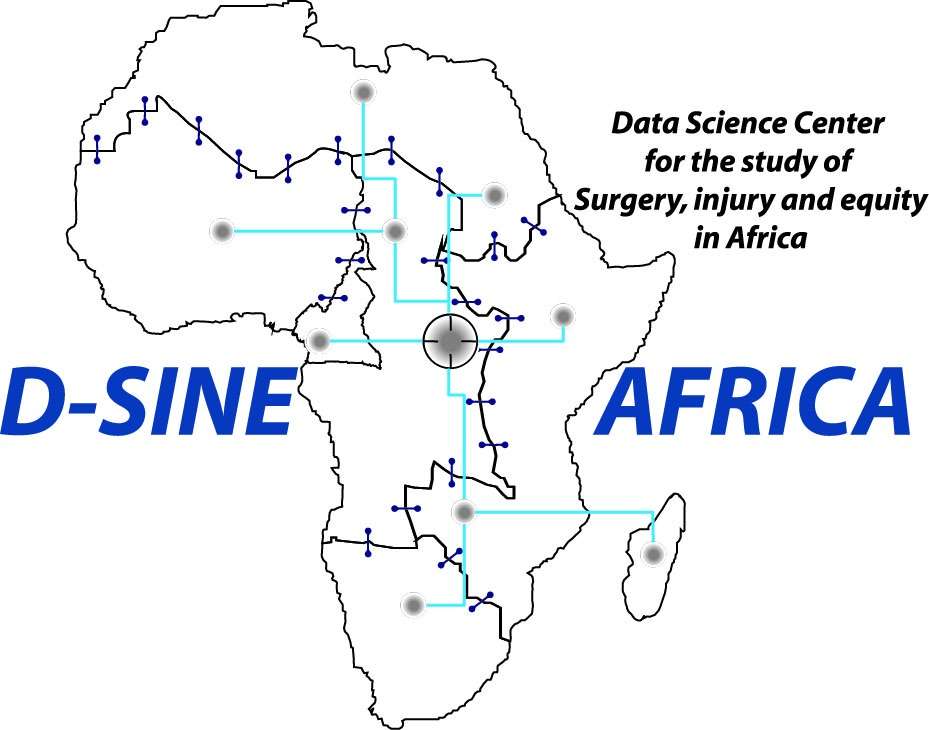D-SINE Africa

Program Overview
Injuries and other surgically treated diseases comprise a significant burden of disease in Cameroon and other sub-Saharan African (SSA) countries with deep inequities that are particularly unmasked in acute care settings. D-SINE Africa Hub will focus on the intersection between injury and equity, leveraging data science to decrease the impact of trauma, surgical disease, and disparities on the population of Cameroon and SSA by promoting collaborative research, networking, and capacity building with an emphasis on equity.
Our Vision
To explore whether advances in Data Science (DS) applied in the African context can spur new health discoveries and catalyze innovation in healthcare and health research on the continent.
Background
The Data Science Center for the Study of Surgery, Injury, and Equity in Africa (D-SINE-Africa) is one of seven Research Hubs in the Harnessing Data Science to Promote Equity in Injury and Surgery for Africa (DS-I-Africa) initiative funded to advance data science health research and innovation in Africa.
D-SINE Africa is a strategic partnership between the University of Buea (Buea), Program for the Advancement of Surgical Equity (PASE) at the University of California Los Angeles (UCLA), the University of California Berkeley, The Ministry of Public Health in Cameroon (MOPH), the African Institute for Mathematical Sciences in Cameroon (AIMS-Cameroon), and the University of Cape Town in South Africa (UCT). We have partners from the Congo-Basin Institute in Cameroon, researchers from Soroti Regional Referral Hospital in Uganda, and the UCLA Center for HIV Identification, Prevention, and Treatment Services. This coalition is built upon a long-standing collaboration between Buea and UCLA focused on decreasing the burden of surgical diseases in Cameroon and other sub-Saharan African (SSA) countries. Injuries and other surgically treated diseases comprise a significant burden of disease in SSA, but opportunities for research and funding are lacking. Our work on injury and other surgical emergencies has identified deep inequities that are particularly unmasked in acute care settings. The intersection between injury and equity is our priority area of study, as the inequities revealed by trauma are often symptomatic of larger, systemic, cross-cutting issues.
Strategic Plan
Mission
Our mission is to leverage data science to decrease the impact of trauma, surgical disease, and disparities on the population of Cameroon and sub-Saharan African (SSA) countries by promoting collaborative research, networking, and capacity building.
Our Goals
Research: To promote novel, high impact, and transformational research applying data science to reduce the burden of injury and surgical diseases through epidemiological studies, prevention strategies, disease surveillance, and clinical care optimization.
Networking: To create and enhance connections between scientists, institutions, and stakeholders within its Cores, Projects, and the Harnessing Data Science for Health Discovery and Innovation in Africa (DS-I Africa) Consortium. These novel partnerships will create new ways of looking at injury and surgical disease, speed uptake of findings on high impact, evidence-based interventions, and promote innovative, multidisciplinary science on injury, equity, and surgical disease.
Capacity Building: To mentor and train researchers, policy makers, providers, community leaders, and staff members in advanced analytic methods and public health approaches to address critical issues in injury and equity.
Our goals will be implemented across three Cores and two Research Projects:
The Administrative Core leads the D-SINE Africa interdisciplinary team, convenes meetings, and coordinates science, networking and capacity building agendas. It leads strategic planning initiatives, manages existing and new partnerships, and manages administrative, financial and dissemination functions.
The Data Management and Analysis Core [link] guides innovation and impact in data quality, statistical methods, and implementation science. It manages the secure housing of data, oversees quality, and supports effective data management and analysis across D-SINE Africa’s Cores, Projects, and partners.
The Capacity Building Core will support development of a diverse cadre of SSA researchers, mentor D-SINE Africa Research Fellows, implement and support the Seed Grant Program, and leverage D-SINE partners’ resources to strengthen administrative capacity towards research training and administration. Two Research Projects on Health Equity Surveillance [link] and Trauma Follow-Up Prediction [link] will use data science to address urgent priorities at the intersection of surgery, injury, and equity over the next 5 years.
D-SINE Africa efforts will drive innovation and impact in data science, injury, and equity research to improve access to surgical disease prevention and care, including those whose socioeconomic status conspires to increase their vulnerability to injury and surgical conditions while reducing consistent surgical care access.